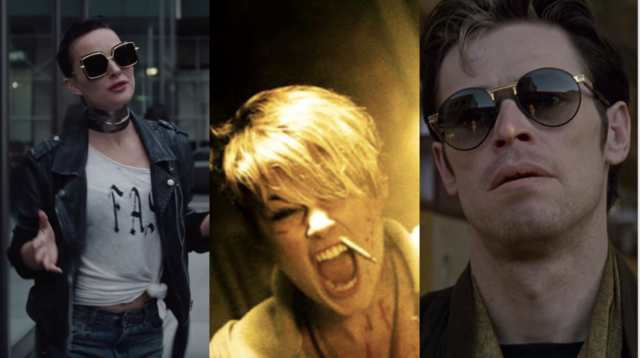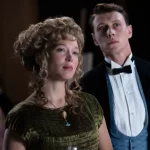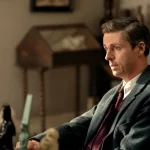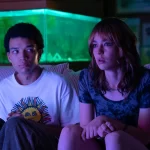Scott’s Movie Journal #7

The Climb (Michael Angelo Covino, 2019)
(first view)
A very promising debut. Each scene is handled in one shot, and while its bravura sometimes threatens to eclipse its beauty, the writing and performances are so honest that it doesn’t really turn into the stunt show a few scenes suggest the whole could be.
Domino (Tony Scott, 2005)
(no idea how many times I’ve seen this, at least half a dozen)
This coming out in 2005, when I was 19, when Tarantino was the coolest and Sin City and Oldboy had just come out, and there was this whole nexus of super-stylish super-violent movies still burning out in the wake of the crime-movie resurgence of the 90s, and for this thing to come along and take everything those films were doing and push it past and past and past the breaking point of style, beyond where any narrative film, let alone any mainstream narrative film, has gone since…man I remember watching this in the theater feeling like the screen was about to explode and my whole body was on fire. I still get that sensation every time.
There’s nothing else like it, and since film was about to burn out of the system a few years later, there probably never will be. This mixed-media, hand-cranked bucket of madness with a script just as loopy to boot and a pool full of the coolest actors who can’t be stopped still stands utterly alone, its well of energy and the brilliance of its lunatic construction impossible to meet head on. The editing is so fast and so sharp you could be hard-pressed to even count the seams, to even recognize what is a seam, lending whole new meaning to the idea of the moving picture. Tony Scott had already experimented with this in Man on Fire, but cinematographer Dan Mindel takes it to a whole other place here, less overtly concerned with concrete beauty and fine to wallow in the muck of the pure radical nature of what they were doing, Richard Kelly’s screenplay giving the whole thing license to do anything and be anything.
Knightley’s done better work since, but nothing crystalized her as a star more than this. She doesn’t command the screen; she demands its attention, and she gets it.
Interstellar (Christopher Nolan, 2014)
(second view)
I put off revisiting this for a while because the experience of seeing it in IMAX was so overwhelming and so powerful that I didn’t think a digital home presentation would have much to offer. Man was I wrong. The tactility Nolan insisted on is so key to distinguishing this, the blend of technologies virtually not attempted by anyone else, creating a space movie quite unlike any other, and to my mind the best American one of the 21st century.
Moreover, Nolan – once a razor-sharp writer whose scripts have only gotten messier as he’s continued – for once prioritizes humanity in his messiness rather than scrambled logic. And I’ll take a film desperate to keep up with its heart rather than its concept any day.
Also, to get super reductive about it, a great space movie has to have a great robot. There hasn’t been as good a robot as TARS in decades.
Road to Perdition (Sam Mendes, 2002)
(third view, probably; hadn’t seen since at least 2003)
Stately, sturdy, and much like its Irish-to-the-bone characters, restrained in its sentiment even as you can feel it welling up inside, which lets its reservoir of feeling come out in the seams, these little glimmers of emotion everyone keeps damming up but can’t fully restrain. Hanks is maybe even too sentimental for his character, latching onto any bit of humor he can play, but this laid the groundwork for a lot of really stunning, subdued work in the years since (most especially News of the World, which bears a more-than-superficial resemblance). It also practically goes without saying but it is truly, stunningly beautiful, smart in its shot choice and diligent in finding the fullest expression of those choices.
House of Games (David Mamet, 1987)
(first view)
There’s an interesting sort of thing Mamet does here that’s hard to completely parse from the vantage point of 33 years later. See, the whole con narrative here seems completely obvious, having seen a thousand insane iterations of it since then. But I doubt it was so obvious then. But also maybe it was, because Mamet sort of undercuts it at the end, positing something a little stranger, a little kinkier, a little wilder driving things all along. But it’s also not exactly a revelation, but certainly even non-revelations can carry some heft when foregrounded at the end. I don’t know. Subject for further thought, maybe, if I get to thinking about it.
Every Girl Should Be Married (Don Hartman, 1948)
(first view)
The quest to see every Cary Grant movie (48 down…..25 to go? Thereabouts) has inevitably led me to some of his more…not good movies. And not even “not good” in a notable way, just like “not good” like it’s just kind of there and exists and RKO had to put out a movie every week and a half or so after all. It’s not a bad premise – a girl, determined to be married, randomly runs into the eminently-marriable Cary Grant, and sets about cornering him into marrying her. After all, why shouldn’t the girl pursue? A noble enough notion, less so in practice when it just becomes stalking him and lying to him and ruining his professional appearances and so forth. And Betsy Drake – in her film debut, after a smitten Grant landed her an RKO contract, and who did not have much of a career – really only plays one note, this glassy-eyed lovey-dovey look that really underscores the creepiness of it all. Director Don Hartman, making his second of a total of four movies, doesn’t seem interested in pushing for more either.
Vox Lux (Brady Corbet, 2018)
(second view; last saw upon original release)
Always liked this, and while I still can’t elevate it to the realms of greatness (even adding it to my best of 2018 list, I had to put it near the bottom), damn if I haven’t thought about it pretty consistently for the past two years. It’s not that what it has to say is so terribly deep, but it is so terribly passionate about saying it. And aesthetically, Lol Crowley’s blown-out lighting and slightly-fishbowled lens and whirling camera keeps things just on the edge of exploding, more than prepared for when they finally do, courtesy of Natalie Portman’s out-there-and-loving-it performance and Corbet’s youth-fueled confidence.
The two-part structure, which shows Celeste’s traumatic childhood and rise to fame in one part and her adult life in the other, could have so easily felt like too much for one movie, but something about the way the first part spans several years while the second takes place over one day gives it some intangible balance, a more determined structure than what could have been just a fictional biopic. If the latter sometimes gets too expository, well, them’s the breaks, but even that works out pretty well when you have Willem Dafoe to do the gaps-filling narration.
I also have absolutely no problem with the ending, which I will not divulge here, but which could easily break a wieldier film. This one can take it.
Death and the Maiden (Roman Polanski, 1994)
(first view)
Polanski has sort of routinely come around to these films in narrow settings about women humiliating powerful men, and while I wouldn’t trade them wholesale for his better-known paranoid thrillers, they do seem at least as, and perhaps even more, vital to understanding what makes him tick as those do.
This is a particularly heady one, having been adapted from a hit 1990 play about three people in an unnamed South American country after the fall of a dictatorship and the implementation of democracy, dealing with the remnants of state-sponsored torture. Ironically, given that it came from a Chilean playwright and saw its first workshop production in Chile, its “world premiere” happened in London and it went onto play Broadway, both times with casts that…one would not traditionally associate with any South American culture (Glenn Close, Richard Dreyfuss, and Gene Hackman on Broadway, for example). The 90s were a different time all right. But that at least gave some context through which one can understand why, say, Sigourney Weaver has the lead role here.
Anyway, this is all a lot of preamble to note that Polanski’s adaptation is very strong – as he tends to with stage adaptations, he makes everything outside the main set utterly artificial, further concentrating and isolating the action so that when it reaches extremities, there really is the sense that the outside world has no bearing on this place. Weaver, Stuart Wilson, and Ben Kingsley make a very fine trio, Weaver in particular more than convincing as the central force to be reckoned with even before she more violently takes charge of things. As these things tend to go, the myth that the 80s and 90s represented some kind of “down” period for Polanski doesn’t seem to be holding up well. I’ve yet to see Pirates or The Ninth Gate, but this, Frantic, and Bitter Moon (all of which I’ve seen for the first time over the past 18 months) are enough to put that claim firmly into fiction. Sure they’re not Chinatown, but then, what is.
Buffalo ‘66 (Vincent Gallo, 1998)
(first view)
One of those I’d long meant to get to and it always just got away from me. I love movies about sensitive assholes, and this has one of the greats, though your mileage may understandably vary with that sort of thing. If you don’t think Billy is an amusing subject of mockery, his outlandish putrid character amusing at a distance, then yeah, this will not work out, and the film thankfully front loads a lot of his more despicable traits to let you know how it’ll be. There is a further uncomfortable push-pull in how it leeringly views then-17-year-old Christina Ricci, and – reportedly – outright exploits her by letting Ben Gazzara nuzzle into her breasts unannounced, that could be considered productive when you contrast it with how Gallo’s character completely resists any kind of romantic or sexual contact with her for the entire film. In a sense, she’s not so far removed from the Manic Pixie Dream Girl, in that Billy outright kidnaps her and she still very quickly falls in love with him, but I’d argue Gallo lets himself off the hook of having to explain it with a long close-up of her face listening to him explain his whole insane plan near the start.
Furthermore, the whole thing is so explicitly distorted in Billy’s mind that it’s tough to take any of it literally, and I spent most of the day trying to think of the vibe it gave off, until I realized it mostly felt like The Room if it was good. Both are totally self-indulgent journeys into a narcissist wondering why the hell people don’t like him more, and Buffalo ‘66 has a whole sequence just dedicated to Vincent Gallo showing everyone what a good bowler he is, which is like the most Tommy Wiseau move ever. Both also had troubled productions where the writer/director/star humiliated/alienated/exploited nearly everyone involved. But I have often defended the room on the merits that it provides a window into Wiseau’s soul, and Buffalo ‘66 certainly does the same, for better or worse. I guess it’s just different speaking in those terms with two films that have very different reputations.
Drugstore Cowboy (Gus Van Sant, 1989)
(first view)
Now I’ve only Even Cowgirls Get the Blues to go before being Van Sant Complete, a status I can only assume will lead to ultimate enlightenment. Anyway, this is a very fine film, but in retrospect it’s hard not to see how much better he’d build on so much of this in the years to come. Some of it just functions a little awkwardly – Matt Dillon’s supposed to be this older, more seasoned leader of a pharmacy-robbing gang, but his protegee is James LeGros, who’s not only literally older than him, but looks older than him, too. Dillon’s youth does create a cool dynamic between he and Kelly Lynch, who, again, both is literally and reads onscreen as older than him.
Nevertheless, the narrative is one Van Sant would grow accustomed to and sharpen, all the way up through Don’t Worry, He Won’t Get Far on Foot, of these people in turmoil, eventually finding their place in the world or at least some sense of inner peace. Dillon’s transformation here is just too abrupt, and even if it makes “sense” narratively, it doesn’t quite click emotionally. But there’s still so much life to the characters, so much detail to their world, so much humor in their paranoia and petty thefts, that it’s hard not to dig the film’s groove. And there’s a small montage here set to Desmond Dekker’s “The Israelites” that really feels like it was tapping into the Goodfellas vein juuuuuust before Goodfellas got there. I know it doesn’t check out chronologically for Scorsese to see it and go “that’s it!” but, y’know, something was in the water.
Light Sleeper (Paul Schrader, 1992)
(second view; first saw in March 2020)
As the date above suggests, this was one of the first films I saw in quarantine, and is still maybe the best. I’ve yet to fully dig Schrader’s directorial output; for all his boldness, I can always see the movie he’s trying to make just a little beyond his grasp (except for maybe The Canyons, because that movie could only ever be itself). Not so with Light Sleeper. Like many of his films, its antecedents and reference points are clear enough, but Schrader makes them his own, cementing them in the routine activities of a mid-level drug dealer (Willem Dafoe, the best I’ve ever seen him) who’s trying to figure out the next phase of his life when he happens upon his onetime lover and quasi-wife (Dana Delaney), who is herself at a crossroads, but desperate to not return to his world.
There are a few concrete things I can point to – Dafoe and Delaney’s performances prime among them, plus Susan Sarandon having a field day as Dafoe’s boss. I’ve seen Dafoe play a lot of things, but I’ve never seen him play something so sweet as when he looks at these women with admiration (for Sarandon) and desire (for Delaney). And putting a confident guy on the ropes is always a good premise. Plus the whole thing takes place during a sanitation workers’ strike so the garbage keeps piling up all around them, which is a great visual metaphor for the mounting pressure on him.
But mostly? Mostly, this is just an absolute vibe, driven by a stunning soundtrack by Michael Been and images by Ed Lachman, and Dafoe and Delaney and Sarandon have such great voices, and the dialogue is so precise and so rich, and there isn’t a second of this film that doesn’t enrapture me. If you’re on the vibe’s wavelength, you’ll ride it anywhere, and if not, well, I imagine there might be any number of things you might not dig.
Gerry (Gus Van Sant, 2002)
(seen many times, but it’s probably been a good 12 years…tough one to find the space for)
A brief story.
Gerry premiered at Sundance in 2002, but what with it being a slow and fairly strange movie, didn’t get the ol’ Sundance Buzz and wasn’t released in the States until over a year later (by THINKFilm, which is real “wow, remember them” energy for anyone who hung around the art house circuit in the 2000s). It came to my hometown, Portland, in March of 2003, about a month before I turned 17, and fortunately my dad was willing to take me so I could get in. We both absolutely loved it, for reasons that still sort of confound me. My dad’s taste was always a little outside the mainstream, but nothing this far, and the weirdest movie I would’ve seen by then would’ve been like…Adaptation. For whatever reason though, this completely clicked, and by the time Van Sant premiered Elephant a few months later, I was a full-fledged, art house seeking cinephile. It’s wild how fluid everything is when you’re 16-17.
Anyway. I do specifically remember saying back then how effective the movie was at genuinely conveying the feeling of being lost, how you would just be silent and walking for most of it, and thus there was something sort of realistic about it. With all due respect to the tastes and opinions of my 16-year-old self, this may actually be Van Sant’s most surrealist film. Well…this or Paranoid Park maybe. But the way the desert shifts from this very inviting, green-filled nature trail to something gradually more desolate and eventually totally barren landscape is really striking, as though the environment reflects the way their souls are getting chipped away, if indeed they ever have souls. There’s something at play here with identity that I can’t quite put my finger on; it’s not just that Damon and Affleck call each other “Gerry” throughout, or that only one of them lives through the end, or that each seems to sort of bizarrely transport to unexpected places throughout the film. It’s further between the lines than that.
I did forget how genuinely funny much of this is for the first….I dunno, third or half or so, very hard to keep track of time here. Damon and Affleck have wonderful chemistry that both keeps things livelier than you might expect and suggests a slight societal critique about men (especially white men, if you like) throwing themselves headlong into a situation with absolutely no preparation or plan for getting out, and dealing with the fallout of that in the least serious way possible. Even after a day or two (time is either very easy to trace of very hard to trace, couldn’t say which) of being completely lost in the desert, they are still referring to their whole situation in joking terms (“I thought you succumbed,” “I almost did but then I turboned up,” “dirt mattress,” “shirt basket,” etc.), and only after they are way into it do they start to actually try to retrace their path instead of just wandering aimlessly, sure it will all work out. Van Sant is one of the most cutting social observers to have only ever made a single direct cultural satire (To Die For), but this sense of the way people post for one another, unconsciously imitating the type of person they want to be rather than who they are, is present in much of his work – most obviously in Elephant and My Own Private Idaho, but also present in at least Good Will Hunting, Drugstore Cowboy, Psycho, Last Days, Milk, Promised Land, and Don’t Worry, He Won’t Get Far on Foot. He’s especially attentive to the barriers masculinity puts around the authentic self, how even if you’re not an overt tough guy, many of us are still trying to assert or assume a nonchalant confidence we don’t have.
Anyway, this remains, for me, his best film. I know people are down on Van Sant, but he’ll always be one of the greats to me.






























